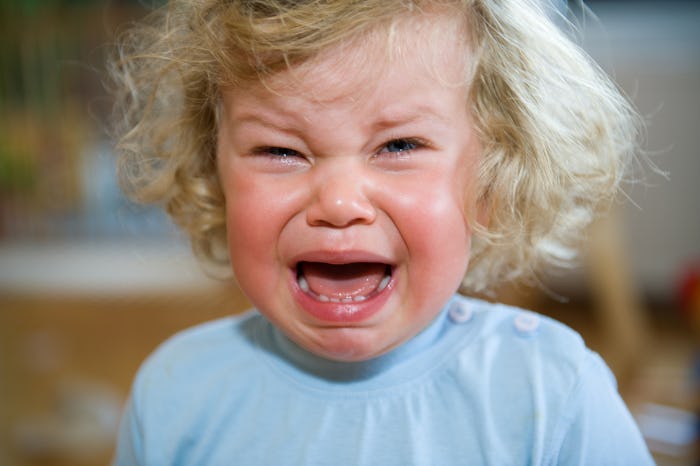Life

What You're Doing When You Yell At Your Kids During A Tantrum
With two little ones just 21 months apart in age, there are days when my stress levels are through the roof. A trip to the store, or even a fun day out, with toddlers can mean a meltdown is looming. Unfortunately, for me, that sometimes means tantrums get the best of me, especially when those tantrums have been happening frequently. Blowing up on my kids from time to time has often led me to wonder what you're doing when you yell at your kids during a tantrum. That mom guilt is no joke, you guys.
It’s perfectly normal for emotions to get the best of you when stress levels are high and sleep is nonexistent. It's important to keep in mind, though, that even when you feel your little ones are out to drive you crazy, they’re not. In an interview with Parenting, Author of Negotiation Generation: Take Back Your Parental Authority Without Punishment Lynne Reeves Griffin said that children aren’t throwing tantrums to upset you. Instead, children aren’t quite sure how to control or express their emotions.
Turns out, a toddler's tantrum isn't all that different from a parent's frustrated reaction to it. In fact, It’s eye-opening to realize that often parents yell because they’re overwhelmed or angry, essentially also struggling to control their emotions, according to Healthline. The difference is that parents often do have the ability to control their reactions and emotions (or they're at least better equipped to do so). And because children rely on their parents and caregivers for learning, yelling may not be a response or anger-associated behavior that’s good to exhibit in response to kids’ behavior.
In an interview shared by the aforementioned Healthline article, Parent Educator Dr. Laura Markham shared that a parent’s number one job, after monitoring their children’s safety, is to manage their own emotions. Additionally, yelling often has the opposite effect: instead of getting a message across, it eventually teaches children to tune it out. This can make disciplining even more difficult in the long run.
Long-term effects of yelling at children are also a factor to take into consideration. The National Institute of Health (NIH) shared that yelling can make a child more aggressive, both verbally and physically. One study published in the Child Development Journal even went as far as to compare yelling to physical punishment, like spanking. Yelling is also associated with long-term effects like anxiety or low self-esteem.
So the next time you’re feeling overwhelmed and ready to yell, consider some alternative tactics you can try out instead. According to Parenting From The Heart, it’s important to first remain calm because “parents who remain calm have the greatest success when mediating tantrums.” Next, you’ll want to wait until you feel your child is ready to listen, and at that point, acknowledge and affirm their feelings. During these moments, it’s important to coach your child, too. This can be done by offering a solution to communicate their needs next time. Lastly, according to Aha! Parenting, end the interaction with physical connection, like a hug to your little ones to help them feel more secure and connected.